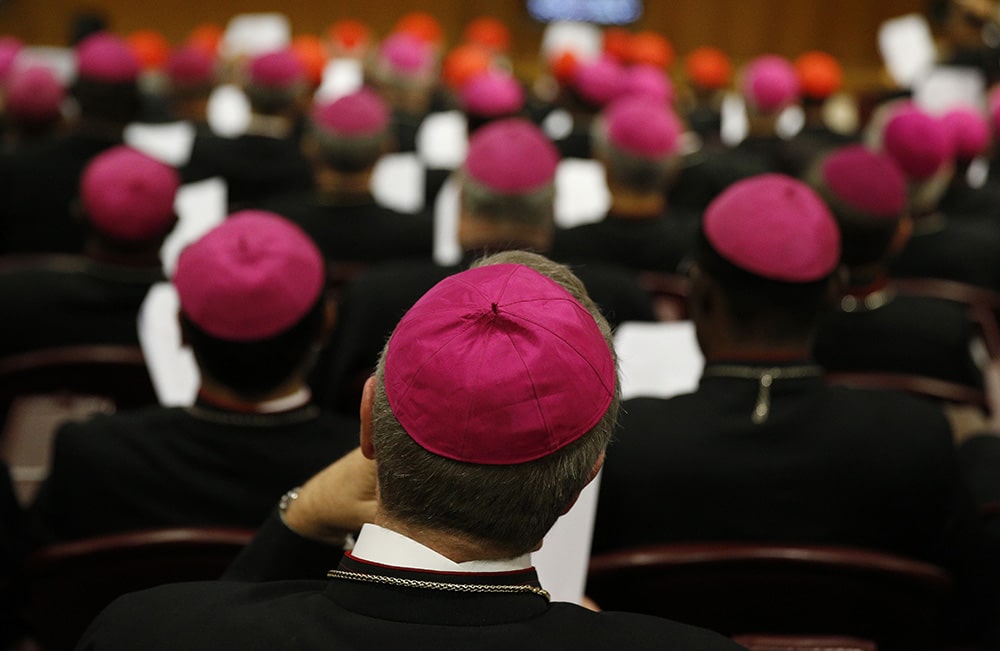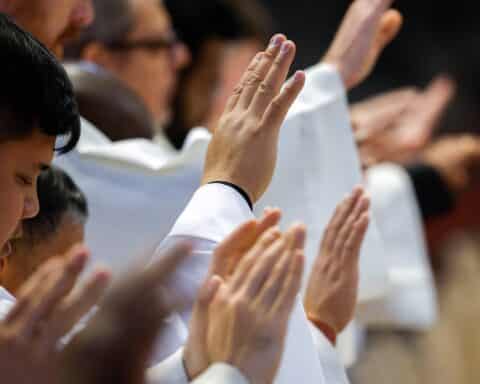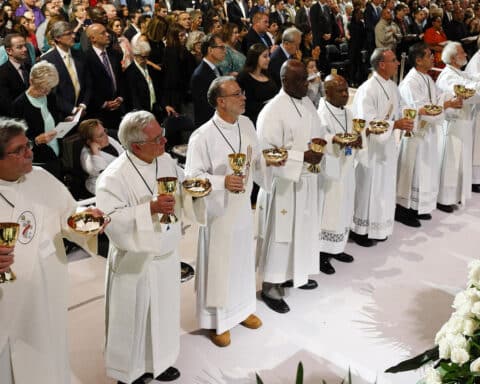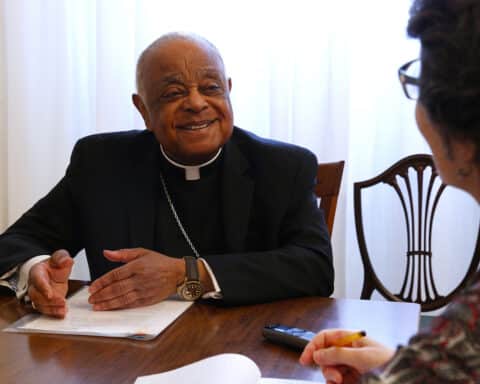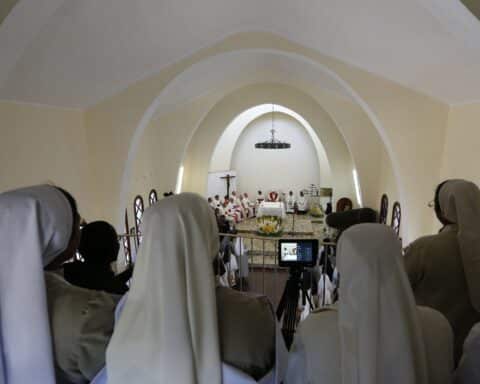
Today the Church has grown sick of pseudo-synods in Rome spending too much time talking and not enough time acting. Today one of the medicines to heal the Body of Christ is precisely a recovery of real synods, not in Rome but in every diocese, functioning not as a debating chamber but as a decision chamber with real powers. How would that help, and what are the risks?
Synods were found across the Catholic world until the late 19th century when a centralizing papacy began insisting on a right to appoint bishops everywhere. In doing so, the papacy strangled both local organs of governance like diocesan synods and provincial councils, and their practices of electing bishops and holding them accountable.
Catholics today are utterly fed up with unaccountable bishops. In theory, the pope is supposed to hold bishops accountable, but I learned as a department chair at the University of Saint Francis in Fort Wayne, Indiana, for many years that nobody should have more than a dozen “direct reports,” that is, 12 people (at most) whom you hold accountable by supervising them in a meaningful manner. With more than 5,000 bishops in the world, it is obviously impossible for one pope to hold even 1% of them accountable. That is properly the job of local synods.
What might this look like in practice? Consider, as I have recently argued elsewhere, the plight of the Diocese of Buffalo. In a proper synodal system — which is deeply rooted in Catholic tradition but also finds models in several Orthodox Churches, among others — the people of Buffalo would have several ways of holding Bishop Richard Malone accountable after well over a year of horrendous revelations of many abuses of sex and power.
Properly constituted synods elect their bishops, meet at least annually under his presidency to pass legislation for the diocese, and vote the bishop’s budget up or down. In many synods, the bishop presents an annual report on his conduct and specifies his priorities for the upcoming year, and the people (composed of elected lay and clerical delegates from every parish) have a chance to challenge him on both his priorities but especially his failings. The great Ukrainian Catholic metropolitan Andrey Sheptytsky (declared “venerable” by Pope Francis in 2015) in September 1899 immediately following his episcopal consecration, noted with singular humility that “the people are completely right to demand certain things from a bishop, and it is absolutely correct to censure him if he shirks the task that he has to perform on behalf of the Church and his people.”
A bishop’s shirking or incompetence could, under carefully considered canons, trigger his indictment and trial in a properly constituted tribunal, which would include his peers in the episcopate. If found guilty, he could be disciplined or even deposed from office. He would have the right to appeal this to a regional appellate court, and finally to Rome, whose decision would be final. (Scholars agree that Rome as an appellate tribunal for bishops dates back to the Council of Serdica in 343/4.) These latter two processes are safeguards against the risk of a synod refusing to obey a bishop who is “imparting the word of truth without deviation” (2 Tim 2:15). Safeguards are necessary so that no bishop would be run out of town by a people who “will not tolerate sound doctrine but, following their own desires and insatiable curiosity, will accumulate teachers and will stop listening to the truth …” (2 Tim 4:3-4). On this point it is important to note that a diocesan synod never votes on doctrine or changes to, e.g., a catechism or creed.
Under this system, then, when it would be time to elect a successor of a bishop, the people of the diocese would have the right to propose the names of local clergy they know well and trust. Neighboring bishops could also propose names. And Rome would have the right both to propose its own set of names or to veto — for manifest and grave reasons — those proposed at the local and regional levels. The synod would then investigate each candidate thoroughly before electing a new bishop.
Such elections marry the best of local-synodal governance with the best of universal-papal oversight. They will not, of course, guarantee that every man elected is a saint, but then the papal system has almost never produced saints, as we have evidence of in almost every news cycle. Synodal election would at the very least give Buffalo and every other diocese a fighting chance of finally following Pope Celestine I (r. 422-32), who said that “the one who is to be head over all should be elected by all. No one should be made a bishop over the unwilling.”
Adam A.J. DeVille is author of “Everything Hidden Shall Be Revealed: Ridding the Church of Abuses of Sex and Power” (Angelico Press, $16.95).
| Bishop Malone says he will not resign |
|---|
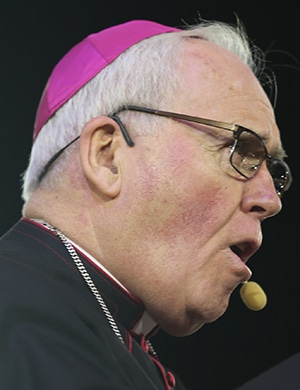 On Sept. 3, WKBW-TV of Buffalo, New York, released a recording of Buffalo Bishop Richard J. Malone in which the bishop said he feared having to resign over his handling of a sexual harassment accusation by a seminarian against a diocesan priest. The recording was made Aug. 2 by Bishop Malone’s priest secretary, Father Ryszard Biernat, who began a leave of absence from his position Aug. 14. Over the last year, Bishop Malone has faced questions about how he has handled allegations of abuse against diocesan priests. In the recording, he is heard saying that the situation he was facing was “a true crisis.” The most recent controversy arose over an allegation from former seminarian Matthew Bojanowski, who accused Father Jeffrey Nowak, a priest of the diocese, of sexual harassment. Bojanowski said he first notified Bishop Malone in November 2018 of the allegation against Father Nowak. The diocese announced in an Aug. 28 statement that Father Nowak had been placed on administrative leave. Several seminarians and at least one diocesan priest called for his resignation following the leak of diocesan files by a diocesan secretary that allegedly show the bishop had kept priests accused of abuse in ministry. In a news conference on Sept. 4 in Buffalo, Bishop Malone said he will not resign: “I’m here because I feel an obligation as the one who was sent here to lead this diocese, to carry on, and once again, if I thought the majority of Catholic people in particular were calling for my resignation, that would be a different story.” |

